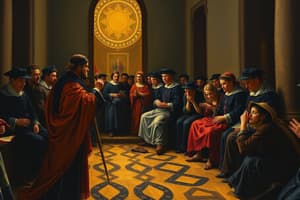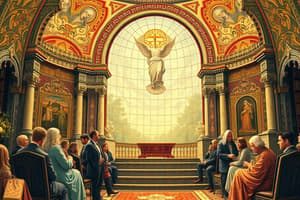Podcast
Questions and Answers
What is true of a secular activity?
What is true of a secular activity?
- It is specific to Christian religious traditions.
- It is compatible with all religious traditions.
- It is separate from all religious traditions. (correct)
- It is specific to Puritan religious traditions.
Which scenario is allowed under the free-exercise clause?
Which scenario is allowed under the free-exercise clause?
- A doctor charges religious patients less money.
- A parent leads a prayer in a public park. (correct)
- A teacher gives out crosses at school.
- A worker places a menorah in the lobby at city hall.
Which example violates the free-exercise clause?
Which example violates the free-exercise clause?
- Allowing a student to wear religious clothing.
- Allowing a private company to run weekly prayer sessions.
- Stopping a religious group from buying a building based on their faith. (correct)
- Stopping a religious group from praying in a city park.
Why was freedom of religion added to the First Amendment?
Why was freedom of religion added to the First Amendment?
A school district in California held its graduation at a local church. Which statement best explains whether this action violated the establishment clause, and why?
A school district in California held its graduation at a local church. Which statement best explains whether this action violated the establishment clause, and why?
In Engel v. Vitale, why did the courts rule that prayer in schools was unconstitutional?
In Engel v. Vitale, why did the courts rule that prayer in schools was unconstitutional?
The First Amendment's free-exercise clause gives...
The First Amendment's free-exercise clause gives...
Courts that use a landmark case as precedent for a decision are...
Courts that use a landmark case as precedent for a decision are...
According to the establishment clause, how would a historical society's posting of the Ten Commandments along with the history of religion and its beliefs and practices be viewed?
According to the establishment clause, how would a historical society's posting of the Ten Commandments along with the history of religion and its beliefs and practices be viewed?
The government gives public funds to low-performing schools for new computers. They decide to give more money to the lowest performers, some of which happen to promote multidenominational religions. According to the establishment clause, how would a court rule on this case?
The government gives public funds to low-performing schools for new computers. They decide to give more money to the lowest performers, some of which happen to promote multidenominational religions. According to the establishment clause, how would a court rule on this case?
Flashcards are hidden until you start studying
Study Notes
Freedom of Religion: Key Points
- A secular activity is distinct from religious traditions, highlighting the separation of church and state.
- Under the free-exercise clause, private prayer led by individuals, such as parents in public spaces, is permissible.
- Violations of the free-exercise clause include actions that inhibit religious practices, such as preventing groups from purchasing buildings due to their faith.
Historical Context
- The First Amendment's inclusion of religious freedom arose from the colonists' experiences with persecution based on religious beliefs, aiming to protect diverse faiths.
Legal Precedents
- Holding school events at denominational churches can breach the establishment clause, indicating favoritism towards a particular religion.
- The Engel v. Vitale ruling deemed school prayer unconstitutional as it constituted a religious activity within an educational setting.
- The First Amendment's free-exercise clause empowers individuals to select their religious beliefs without governmental influence.
Judicial Principles
- Courts relying on landmark cases apply prior rulings as guidance for current decisions, ensuring legal consistency.
- Historical displays, such as the Ten Commandments, may not conflict with the establishment clause if their educational intent is evident and voluntary participation is encouraged.
Government Funding and Religion
- Publicly funded programs can align with the establishment clause if their implementation is secular, non-discriminatory, and does not promote specific religions, even if some supported institutions are religious.
Studying That Suits You
Use AI to generate personalized quizzes and flashcards to suit your learning preferences.




